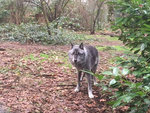


Wolf Haven International is now home to a record 65 wolves, wolf-dog hybrids and coyotes after the recent addition of two new wolves that have been named Mariah and Hodari.
The reserve, located just north of Tenino, is both a sanctuary and endangered species haven for the red wolf and the Mexican wolf. It was founded in 1982, and houses displaced and captive-born wolves.
Mariah is believed to be a gray wolf, according to Sanctuary Director Wendy Spencer, but the actual DNA test results will not be back for a couple more weeks. Mariah was driven to Wolf Haven from the Lockwood Animal Rescue Center in California to be a companion for long-time resident Yukon. Because Mariah is a rescued animal, her age is unknown. Spencer believes she is about 11 years old.
Fellow gray wolf Yukon is 13 years old and has outlived three female companions. When his last companion died, Wolf Haven began looking for a new companion that was slightly younger with the hope that he will not outlive her.
In the wild, wolves live only four to six years, but at the sanctuary they typically live into their teens. Their oldest wolf kept at the sanctuary lived to be a few days shy of 20 years old.
Mariah was found living in suboptimal conditions at “Dancing Brook” in New Hampshire when the Lockwood Animal Rescue Center took over the facility, according to Wolf Haven Communications Director Kim Young. Winters in New Hampshire are harsh, so all the older animals were moved to the Lockwood Animal Rescue Center facility in California. From there, staff attempted to introduce her to two different males, but those attempts didn’t work, so she was left alone.
Similar to people, when wolves meet, their reactions can be positive, negative or neutral. The aim is for as much positive reaction as possible, showing they will make good companions.
“With Yukon and Mariah we’ve seen some positive interaction, but it’s mostly neutral,” Spencer said. “But that’s not to say it won’t happen.”
Since Mariah is a rescue, she will be living out the remainder of her life at the sanctuary.
Hodari is an 18-month-old male Mexican gray wolf brought over from the Endangered Wolf Center in Eureka, Missouri, to be the new companion for 13-year-old Mexican gray wolf Gypsy, whose long-time companion had recently died.
“They had a large family group of Mexican wolves and needed to move some wolves out,” Young said. “It was a good fit for both of us.”
Gypsy’s last partner Diablo died this past summer. She was in mourning, spending much time in her den, so the staff at Wolf Haven quickly began looking for a new partner for her.
“We do try and keep them in pairs. They get lonely. They are very social animals,” said Bethany Elwell, a sanctuary guide.
Unlike Yukon and Mariah, Gypsy and Hodari have had mostly positive interactions. They have been witnessed playing with each other, with Gypsy initiating the activity.
“He’s given her a new lease on life,” Spencer said.
Gypsy isn’t the only one he likes to play with.
“Hodari loves to taunt the coyotes,” Elwell said.
Gypsy and Hodari are currently being kept off the sanctuary tour route while Hodari is acclimating. They need to get fully acclimated to each other, and Hodari needs to get used to the people on the regular tours at the sanctuary. Wolf Haven staff are unsure of exactly when the pair will be reintroduced to the route.
“We’re going to give him as much time as he needs. The nice thing about being a sanctuary over a zoo is that the needs of the animals outweigh the guest experience,” Spencer said.
Mexican gray wolves are one of the most endangered mammals in North America. At one point, there were only seven left. After the Endangered Species Act was passed in 1973, wildlife officials made the decision to aid the restoration of the breed by captive breeding. About 130 Mexican wolves are still in the wild.
Due to the small number of Mexican wolves, the Mexican Wolf Species Survival Plan program was put into place. Wolf Haven International became a part of this program in 1994. It is one of 52 facilities in the U.S. and Mexico that house these wolves. Wolf Haven is also one of three pre-release facilities in the U.S. for the Mexican wolf, meaning that the wolves have a specialized enclosure and contact with people is kept to the bare minimum, just like in the wild.
Wolf Haven has several Mexican wolves that are in the pre-release facility, but Hodari is not one of them. He would be unfit in the wild due to being habituated to people. Wolves in the pre-release facility are preparing to live in the wild and they have minimal interaction with people. According to Spencer, Hodari has associated people with food, so he would be naive and unprepared for life in the wild.